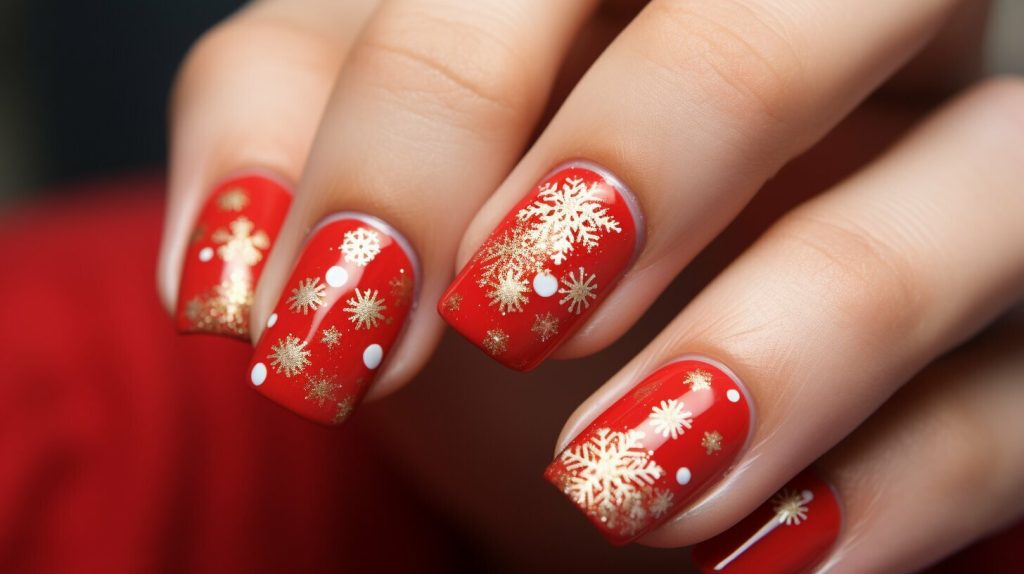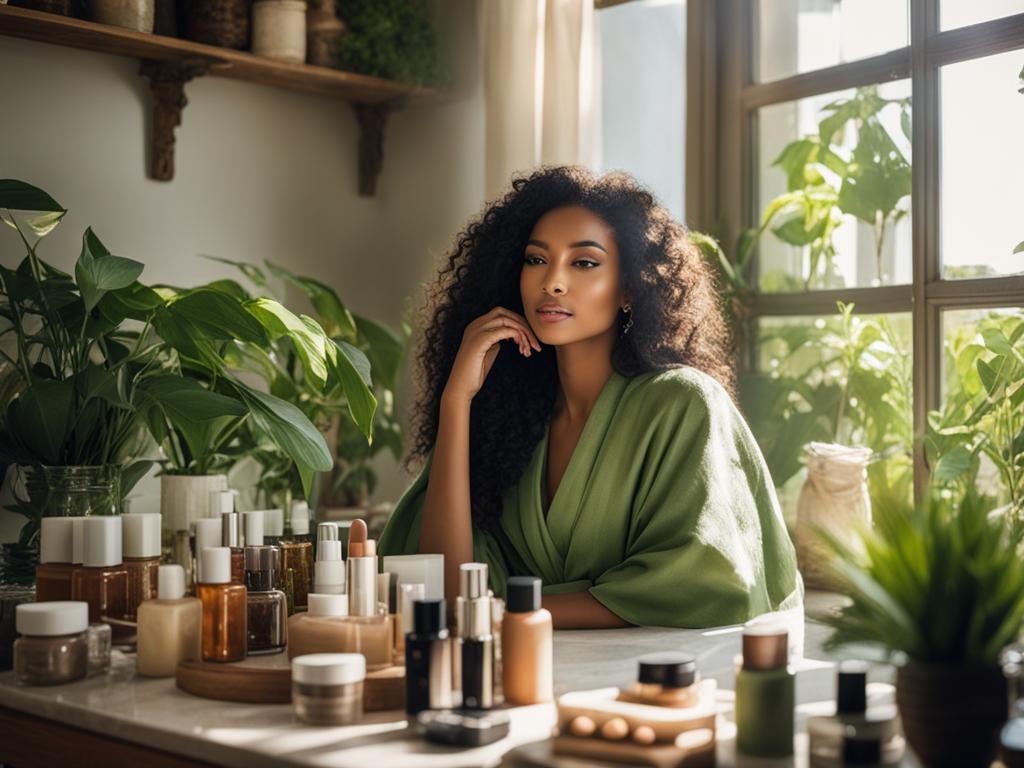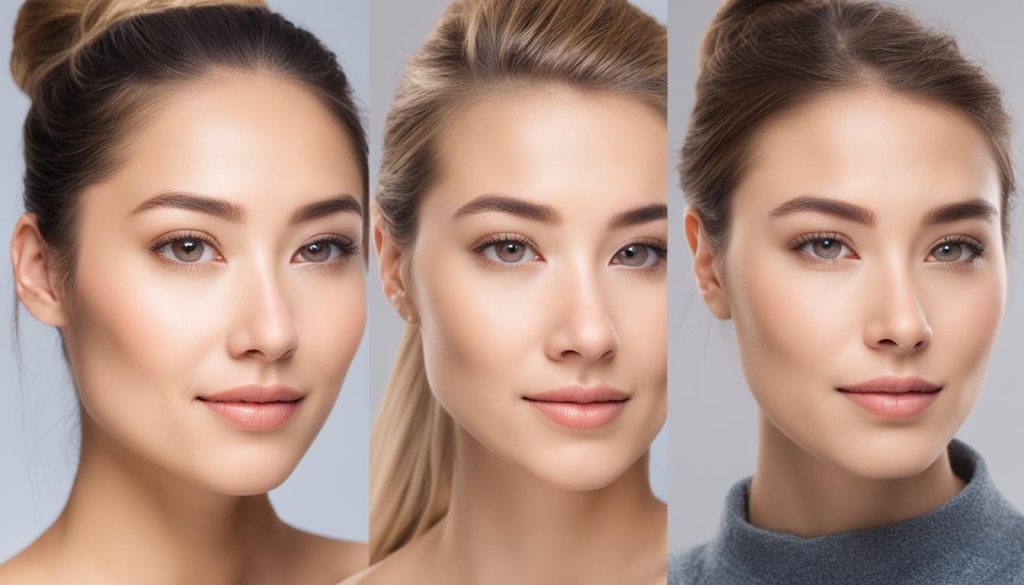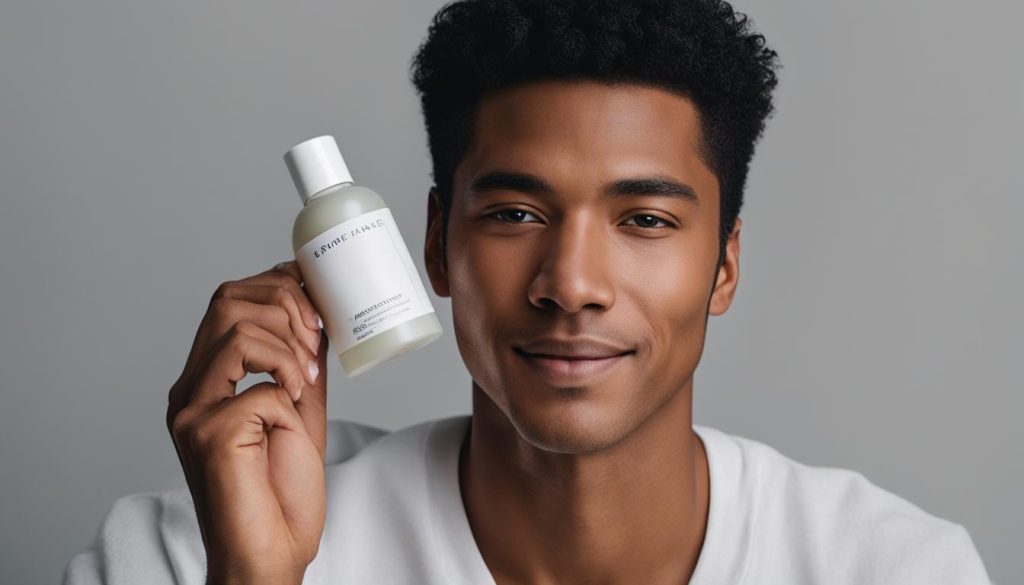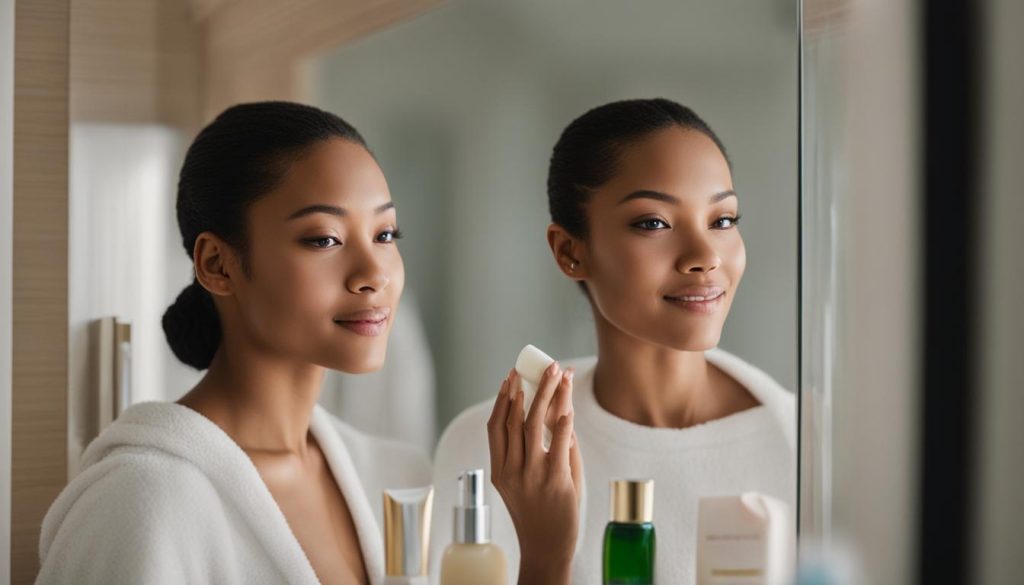As someone deeply committed to the health and radiance of my complexion, I understand that the higher melanin concentration in my black skin necessitates a tailored approach to skin care. Having honed a routine that responds to my skin’s unique needs, I’ve learned that it includes integrating a skin care regimen that prioritizes moisture and protection while addressing common issues such as acne and hyperpigmentation. It’s becoming increasingly clear that what works for the masses doesn’t always cater to the specificity required by black skin. Thus, I rely on credible black dermatologist skin care lines, value-packed black skin care tips, and I am always in search of the best skin care routine for African American skin.
Caring for Black Skin
- Melanin-rich skin demands a personalized skin care routine for black skin to address its unique concerns.
- Implementing a routine aligned with advice from black dermatologists maximizes effectiveness and safety.
- A focus on hydration and noncomedogenic products is key when caring for black skin.
- Dispelling myths, I recognize the importance of sunscreen for all skin tones, including mine.
- Proactive measures, including using the best skin care routine for African American skin, help prevent common issues like dark spots and acne from deteriorating my skin’s health.
Understanding the Unique Needs of Black Skin
My journey in refining an effective skincare for black skin regimen has been shaped by recognizing how differ vastly from lighter tones. Melanin does more than bestow my skin with its rich hue; it influences how my skin reacts to external factors. With distinct characteristics, I’m keenly aware that my skincare must be specifically tailored, incorporating products designed for gentle skincare for black skin.
Grasping the intricacies of black skin problems has led me to understand that conditions like contact dermatitis and hyperpigmentation are not mere inconveniences but are challenges that require targeted strategies. My skin’s propensity for moisture retention and its response to inflammation are crucial considerations when devising my African American skin care regimen.
- Choice of non-irritating cleansers that maintain the skin’s natural balance
- Rich, hydrating moisturizers that lock in moisture without clogging pores
- Diligent use of sun protection to shield against both UV rays and the exacerbation of hyperpigmentation
- Adoption of anti-inflammatory agents to soothe skin and prevent irritation
Each aspect of my skincare routine is an informed decision—rooted in understanding and respecting the unique demands of my black skin. This is how I ensure that my skincare practices serve not only my aesthetic goals but also support the overall health of my skin.
Daily Cleansing and Moisturizing for Radiant Black Skin
As I embark on my journey to achieve the best skincare for African American skin, I’ve learned that a diligent routine is key. Fundamental to this is the art of cleansing and moisturizing twice daily, a ritual that I approach mindfully to ensure my skincare routine for dark skin is as effective as it is nurturing.
Choosing the Right Cleanser for Your Skin Type
Finding a cleanser that compliments my unique skin needs is essential. It’s not simply about making my face feel fresh; it’s about selecting a gentle, noncomedogenic product that won’t strip my skin of its natural oils or clog my pores. I avoid hot water and harsh scrubs in favor of tepid water and soft, circular motions to maintain my skin’s natural balance.
Importance of Moisture and Optimal Products for Hydration
After cleansing, moisturizing black skin immediately is a step I never skip. The right moisturizer provides a barrier that seals in moisture and combats dryness. I opt for hydrating formulas that include humectants like hyaluronic acid to draw water into my skin, and ceramides to protect my skin barrier. By prioritizing cream-based moisturizers over lotions, I ensure that my skin stays resilient and lush.
- I lean towards natural products for black skincare that nurture and protect, limiting chemicals that can be harsh on my skin.
- Fragrance-free products are my preference to reduce the risk of irritation, ensuring that my skincare promotes calm, serene skin.
- I diligently research ingredients and consult with professionals to find the formulas that will best support my skincare goals.
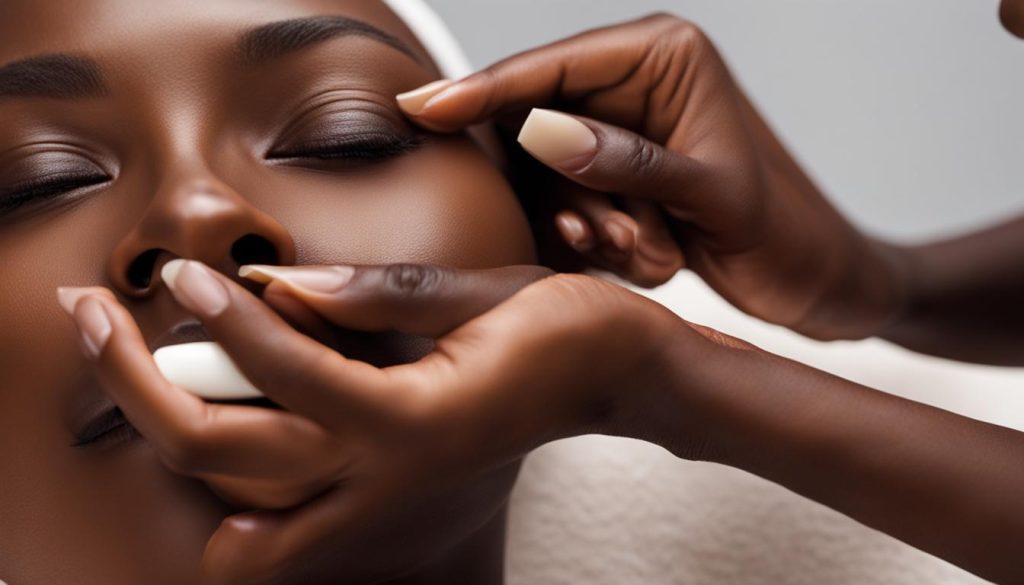
In this meticulous process, I’ve crafted a skincare routine for dark skin that not only addresses my immediate concerns but also fortifies my skin against future issues. This daily ritual supports my skin’s health, showcases its natural beauty, and ultimately, reflects my personal commitment to self-care.
Sun Protection: A Crucial Step in Caring for Black Skin
It’s a profound misconception that has lingered for far too long: the notion that my black skin is somehow exempt from the need for sunscreen. I make it my mission to both bust this myth and reinforce the importance of sun protection as an integral part of my skin care African American regimen. With a diligent application of broad-spectrum sunscreen of at least SPF 30, I take a stand against potential damage caused by UV rays—not just in the sizzling summers, but throughout the entire year, even on those deceptive cloudy days and during the shorter days of winter.
As someone who seeks out only the best products for black skin, I’m acutely aware that the rich melanin in my complexion does not grant me immunity to skin cancer, nor does it protect against the exacerbation of hyperpigmentation. That’s precisely why my sunscreen is a non-negotiable fortress, armor that I wear every day to maintain the health and longevity of my skin. When I speak of black skin maintenance, I am invariably speaking of sun protection as its cornerstone.
Ensuring the use of sunscreen has become a pivotal aspect in my quest to maintain an even skin tone. Avoiding sun damage helps keep my skin free from the irregularities of dark spots and the risk of developing more serious conditions like melanoma and melasma. This practice is not just an act of care, but an act of self-love.
- Choosing broad-spectrum sunscreens that provide both UVA and UVB protection
- Applying sunscreen generously and reapplying every two hours, especially after sweating or swimming
- Incorporating sun-protective clothing and accessories, such as hats and UV-blocking sunglasses
In light of the clear and critical necessity for sun protection in my daily skin care African American routine, I stand committed to educating others about this essential practice, and I stand vigilant in my application of it. This is how I honor my skin, ensuring that it remains as undeniably vibrant and resilient as my heritage itself.
The Battle Against Hyperpigmentation and Dark Spots
In my journey to maintain vibrant and even-toned black skin, I’ve come to realize that managing hyperpigmentation demands precision and awareness. Choosing the right natural remedies for black skin entails a regime that embraces both modern science and the nurturing touch of nature. Effective skincare for African American skin transcends cosmetic appeal; it’s an investment in my dermatological health.
Identifying Effective Ingredients for Evening Skin Tone
My skin regimen revolves around key ingredients that are celebrated for their efficacy. I seek out formulations with retinoids which accelerate cell turnover, brightening my complexion. I incorporate vitamin C, a potent antioxidant, to both brighten and protect. Then, there’s hydroquinone, a controversial champion known for its spot-lightening capabilities, yet I use it with utmost discretion, recognizing both its power and the importance of moderation.
- Niacinamide for its multifaceted skin benefits
- Licorice extract, which has a natural affinity for soothing and brightening
- Azelaic acid, a lesser-known hero that works wonders on dark spots
Integrating these offerings from science and nature allows me to combat uneven skin tone without compromising my skin’s Texture and resilience, offering practical tips for black skin care that anyone can follow.
Products to Avoid That May Exacerbate Hyperpigmentation
Experience has taught me that not all skin care products are friends to my quest against dark spots. I am cautious of any product that may irritate, as inflamed skin often leads to increased pigmentation. I keep a vigilant eye out for:
- Alcohol-based toners that dry and irritate
- Fragrance-loaded creams, which can lead to unwanted reactions
- Certain essential oils, while natural, can be overly harsh if not diluted properly
I must be especially selective, embracing products that promise to nurture without triggering my skin’s reactive side. It takes fine-tuned discernment to sidestep the pitfalls and find the true gems within natural remedies for black skin.
Caring for Black Skin Through Proper Acne Treatment
My journey with black skin acne care has taught me that tackling acne early is crucial for preventing post-inflammatory hyperpigmentation, a common concern for those like me with a darker complexion. I’ve learned that a personalized skincare routine for black skin, which incorporates both spot treatments and overall acne control, is vital for maintaining clear, radiant skin.
Spot Treatment vs. Overall Acne Control Methods
When an unexpected pimple arises, I reach for targeted spot treatments. However, for long-term management, I prefer a comprehensive strategy that goes beyond treating individual spots. I incorporate noncomedogenic cleansers and moisturizers into my daily skincare routine for black skin to control breakouts before they fully develop.
- Benzoyl peroxide – A staple in my acne treatment arsenal for its ability to kill acne-causing bacteria.
- Salicylic acid – I use this for its exfoliating properties that keep my pores clear.
Gentle Skincare Options for Acne-Prone Black Skin
To maintain the health and resilience of my skin, I insist on gentle skincare for black skin that soothes and nourishes without causing irritation. The gentler the product, the less likely it is to trigger the very acne it aims to treat.
- Oil-free hydrators that provide essential moisture without clogging my pores.
- Hypoallergenic formulas that minimize the risk of any adverse reactions.
Consulting with dermatologists has been beneficial in selecting the right treatments that cater to my sensitive acne-prone skin, ensuring I retain my natural glow without compromise.
Nutrition and Lifestyle: Foundations of Gorgeous Black Skin
The tenet that true beauty is cultivated from the inside out is a philosophy I live by, especially when it comes to achieving the best skincare for African American skin. It’s a full-circle approach, connecting every part of my routine to the fundamentals of good nutrition and a healthy lifestyle.
My daily diet is purposely composed to support my black skin care regimen, featuring a balance of:
- Fresh fruits and vegetables, providing antioxidants to combat skin-damaging free radicals.
- Whole grains that offer essential B vitamins for a vibrant skin barrier.
- Lean proteins, essential for collagen production and skin repair.
- Healthy fats like omega-3s from fish and nuts, vital for maintaining skin’s elasticity.
Likewise, I make concerted efforts to limit processed and sugary foods, understanding their potential to disrupt my skin’s balance and negate my dedicated skincare for black skin efforts.
Physical well-being is another cornerstone; regular exercise and adequate sleep are as crucial to my skin’s health as the serums and creams that grace my bathroom shelf. Because in harmonizing body, mind, and skin, I create not just a regimen, but a lifestyle conducive to cultivating my skin’s natural glow.

Conclusion
Embarking on the journey of caring for black skin is an art form that extends far beyond the superficiality of applying products. It’s a commitment to a holistic lifestyle that cherishes and nourishes the unique properties of melanin. I’ve learned that honoring my skin is to understand its distinct needs. My black skin care routine, therefore, is a thoughtful blend of specialized products, healthy eating habits, and a well-curated lifestyle, all acting in harmony to sustain its natural glow and health.
Embracing a Holistic Approach to Skin Care
Adopting a holistic approach means I actively incorporate tips for black skin care that account for every facet of my life. The products I choose to apply are just as important as the foods I feed my body. This synergy of internal and external care is what creates a resilient, radiant complexion that can defy environmental stressors and enhance my personal identity.
Where to Turn for Personalized Advice on Skin Care for Black Skin
For personalized guidance, I seek the expertise of dermatologists with a deep understanding of African American skin. Their specialized advice ensures that my skin care regimen is tailored to my individual needs. By doing so, I ensure that my approach to skincare for African American skin is both effective and nurturing. This tailored care allows me to showcase the inherent beauty of my black skin with confidence and pride.
FAQ
What are some essential daily tips for caring for black skin?
Caring for black skin daily involves gentle cleansing with a product suitable for your skin type, thorough moisturizing with creams or ointments rich in humectants, and applying sunscreen with at least SPF 30 to protect against UV rays and prevent dark spots.
How does black skin differ from lighter skin, and why is that important in skincare?
Black skin tends to have a higher melanin content, which affects how it reacts to inflammation, moisture retention, and sunlight. It’s more prone to certain conditions such as hyperpigmentation and acne scarring, making a specialized approach to skincare crucial.
What should I look for in a cleanser and moisturizer for black skin?
Choose a noncomedogenic cleanser that won’t clog pores and a moisturizer rich in humectants like glycerin or hyaluronic acid. For cleansers, look for mild, hydrating formulas, and for moisturizers, opt for products that offer long-lasting hydration without being greasy.
Why is sun protection necessary for black skin, and which products are best?
Despite higher levels of melanin, black skin is not immune to damage from UV rays, including skin cancer and hyperpigmentation. A broad-spectrum sunscreen of at least SPF 30 is crucial, and products specially formulated for darker skin tones can help avoid a white cast.
What are the most effective ingredients for managing hyperpigmentation in black skin?
Look for ingredients like vitamin C, retinoids, hydroquinone, and kojic acid, which can help lighten dark spots by inhibiting melanin production. Always use these ingredients with care to avoid irritation.
Are there certain products or ingredients I should avoid if I have hyperpigmentation?
Yes, avoid irritating ingredients like fragrances, alcohol, and harsh peels, which can exacerbate hyperpigmentation. Also, take caution with overuse of potent ingredients like hydroquinone, which should be used sparingly and under the guidance of a dermatologist.
What are the best ways to treat acne in black skin?
Gentle, noncomedogenic skincare products are foundational in treating acne for black skin. Topical treatments such as benzoyl peroxide and salicylic acid can be effective. For widespread or persistent acne, consulting with a dermatologist for personalized treatment is advisable.
How does nutrition contribute to the health of black skin?
Nutritional choices greatly impact skin health. A balanced diet rich in vitamins, minerals, and antioxidants, along with adequate water intake, can significantly improve the skin’s appearance by reducing inflammation and promoting healing, which is beneficial for black skin.
Can a holistic approach to skincare improve black skin?
Absolutely. A holistic approach that includes proper skincare, diet, and lifestyle factors such as stress management and sleep, allows for the overall betterment of skin health, helping to maintain its natural glow and mitigate issues specific to black skin.
Where can I find personalized advice for skincare tailored to black skin?
Dermatologists who specialize in skin of color or those with experience treating black skin can provide personalized skincare advice. It’s also beneficial to seek out skincare brands and lines established by black dermatologists for tailored product recommendations.

